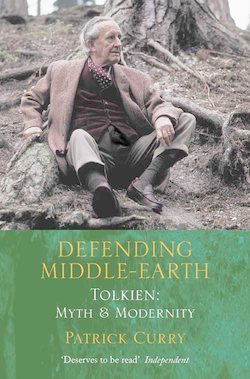Читать книгу Defending Middle-earth: Tolkien: Myth and Modernity - Patrick Curry - Страница 15
Country Folk
ОглавлениеThe hobbits are recognizably modern in important respects, especially in their bourgeois and anti-heroic tenor. Thus, one famous hobbit, when asked by a large eagle, ‘What is finer than flying?,’ only allowed his native tact, and caution, to overrule suggesting ‘A warm bath and late breakfast on the lawn afterwards.’ As several commentators have noticed, it is crucial that Bilbo and Frodo be modern, in order to ‘accommodate modernity without surrendering to it,’ by mediating between ourselves and the ancient and foreign world they inhabit. But in other ways, the hobbits have much older roots. They remind us of ‘the archetypal pre-Industrial Revolution English yeomen with simple needs, simple goals, and a common-sense approach to life,’ and also of the English before their defeat in 1066, when the ‘Norman Yoke’ imposed centralized autocratic government, a foreign language and an alien cultural tradition.
The bucolic hobbits also clearly fall within the long tradition in English letters of nostalgic pastoralism, celebrating a time ‘when there was less noise and more green.’ As Martin J. Weiner notes, ‘Idealization of the countryside has a long history in Britain.’ It extends from Tennyson’s mid-Victorian English Idylls and William Morris’s ‘fair green garden of Northern Europe,’ through the rural essays of Richard Jefferies and the Poet Laureate Alfred Austin’s Haunts of Ancient Peace (1902) – which could easily be the title of a song by Van Morrison today – to Kipling’s ‘Our England is a garden,’ and George Sturt listening to his gardener (note), ‘in whose quiet voice,’ he felt, ‘I am privileged to hear the natural fluent, unconscious talk, as it goes on over the face of the country, of the English race.’ In short, a deep cultural gulf had opened between England’s southern and rural ‘green and pleasant land’ and her northern and industrial ‘dark satanic mills’; or as Weiner puts it, with unintentional aptness, ‘The power of the machine was invading and blighting the Shire.’
The irony is, of course, that since 1851 over half the population on this island has lived in towns, and by then England was already the world’s first urban nation. Thus, as Weiner writes, ‘The less practically important rural England became, the more easily could it come to stand simply for an alternative and complementary set of values, a psychic balance wheel.’ But few things are that simple, and when applied to Tolkien, such glib simplification has led to a great deal of misunderstanding. The related charges commonly laid at Tolkien’s door are several, and severe. They are also almost entirely mistaken, so I shall use them to arrive at the truth of the matter.
